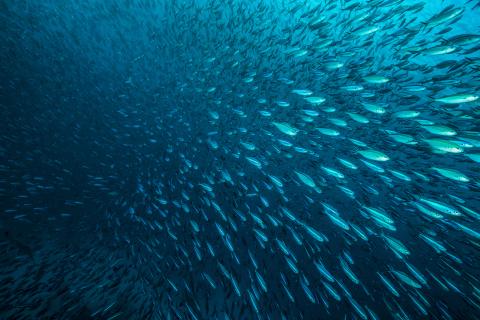
Image: A huge school or "bait ball" of sardines.
New research led by scientists from the Woods Hole Oceanographic Institution in collaboration with scientists from a number of institutes has revealed that fish are playing a previously unrecognised role in ocean chemistry by naturally excreting carbonate particles that sink to the deep sea.
The research titled Fish Carbonates in the North Atlantic and Their Potential Role in the Carbon Cycle, published in Global Biogeochemical Cycles, provides the first direct evidence of fish-derived carbonates in the open ocean, highlighting a hidden biological process that may influence carbon cycling and surface ocean chemistry on a global scale.
This discovery is enabled by over three decades of continuous particle flux monitoring at various depths in the North Atlantic. During this time, researchers repeatedly observed unusual “blue particles” in sediment trap samples, which had remained unidentified since the early 1990s. These have now been confirmed as originating from fish guts.
A Natural Process with Far-Reaching Implications
To maintain salt and water balance in their bodies, a process known as osmoregulation, marine fish precipitate and then excrete carbonate minerals from their intestines. While this has been observed under laboratory conditions and very shallow coastal areas, this is the first conclusive evidence that the same process is happening in the open ocean.
These carbonates are chemically distinct from those produced by plankton or corals, and are characterised by a high magnesium content. Once released by fish, they sink and are typically thought to dissolve rapidly, contributing to CO2 removal and elevated alkalinity in seawater at the depth they dissolve. They have previously been found intact in shallow coastal seas at depths of a few metres but never found undissolved at depths of several hundred metres. This raises intriguing questions about why some fish carbonates can survive at these deeper depths, what species they derive from, and what makes them blue in colour. Critically we also need to understand what proportion of fish carbonates dissolve before reaching these depths.
Challenging Traditional Views of Fish in the Ocean
Dr Rod Wilson, University of Exeter co-author of the research and Principal Investigator of a NERC-funded BIO-Carbon project on fish carbonates , said: “This research challenges our assumptions about the role of fish in the ocean. Beyond their ecological and economic importance, they may also be playing a part in regulating ocean chemistry.”
As the ocean responds to climate change, shifting ecosystems, and human pressures, understanding the full range of biological processes at work becomes ever more urgent. This study adds a new dimension to that understanding, revealing that fish may be silent engineers of the ocean’s carbon cycle.
Read the full study in Global Biogeochemical Cycles:
https://doi.org/10.1029/2024GB008387
- Log in to post comments